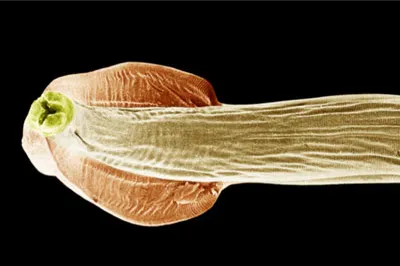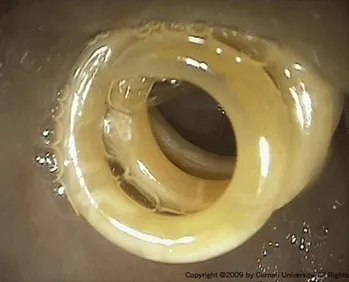Roundworms are among the most prevalent internal parasites affecting dogs, with nearly all puppies becoming infected at some point in their lives. These insidious worms can be transmitted in various ways, making them easy to spread and a persistent challenge for pet owners. While commonly associated with canine health issues, a critical question often arises for concerned pet parents: Can You Catch Roundworms From Your Dog? The answer is a definitive yes, and understanding this zoonotic risk, along with effective prevention strategies, is crucial for safeguarding both your pet’s health and your family’s well-being. This article delves into the nature of roundworms, their impact on dogs, and crucially, how they can affect humans, offering comprehensive guidance on prevention and protection.
What Are Roundworms and How Do Dogs Get Them?
Roundworms, primarily Toxocara canis in dogs, are spaghetti-like parasites that reside in the small intestines of infected animals. Their life cycle is complex, contributing to their widespread nature. Puppies are particularly vulnerable, often contracting roundworms from their mother before birth through the placenta, or shortly after birth by consuming larvae in her milk. This makes early and regular deworming of puppies essential.
Beyond maternal transmission, dogs can acquire roundworms by ingesting embryonated eggs from contaminated environments, such as soil, grass, or feces of infected animals. The microscopic eggs are remarkably resilient and can survive in the environment for months or even years. Additionally, dogs can become infected by eating paratenic hosts – small mammals like mice, rabbits, or birds – that have ingested roundworm eggs and have larvae encysted in their tissues. Once ingested by a dog, these larvae mature into adult worms in the intestines, completing the cycle and shedding new eggs into the environment through feces. This complex web of transmission highlights why controlling roundworms requires a multi-faceted approach, encompassing hygiene, regular veterinary care, and awareness of how these worms can be passed from dog to dog.
Signs and Symptoms of Roundworm Infection in Dogs
Many adult dogs with mild roundworm infections may show no outward signs, making regular veterinary check-ups and fecal examinations vital for early detection. However, in more severe cases, particularly in puppies, roundworm infection can manifest with a range of noticeable symptoms. These include diarrhea, vomiting (sometimes with visible worms), weight loss despite a healthy appetite, a dull coat, and a characteristic pot-bellied appearance, which is often due to the sheer volume of worms in the intestines. If the migrating larvae move into the lungs, a cough might also develop.
Observing adult roundworms in your dog’s feces or vomit is a clear indication of infection. These worms are typically white or light brown, smooth, and can be several inches long, resembling strands of spaghetti. If you notice these signs or suspect an infection, prompt veterinary attention is crucial. For pet owners concerned about finding worms in their dog’s poop and what to do, immediate consultation with a veterinarian is always recommended.
 Close-up of a canine roundworm (Toxocara canis), a common intestinal parasite in dogs.
Close-up of a canine roundworm (Toxocara canis), a common intestinal parasite in dogs.
The Critical Question: Can You Catch Roundworms From Your Dog?
Yes, humans can indeed catch roundworms from their dogs. This is a significant public health concern, particularly for children. The disease in humans is known as Toxocariasis, and it’s a type of zoonotic infection, meaning it can be transmitted from animals to humans. Unlike dogs, humans are not the natural host for Toxocara canis, so the larvae typically do not develop into adult worms in the human intestine. Instead, the larvae migrate through various tissues and organs, causing different forms of disease.
Human infection occurs when people accidentally ingest embryonated roundworm eggs present in contaminated soil or pet feces. These eggs are microscopic and can be picked up from the environment, especially in areas where pets have defecated. Children, due to their play habits and less diligent hand hygiene, are at a higher risk of ingesting these eggs when playing in parks, sandboxes, or even their own backyards if contaminated. While this risk is real, it’s important to note that can a person get heartworms from a dog is a different question; heartworms are not typically transmissible to humans in the same way roundworms are, emphasizing the need to understand specific parasite risks.
Symptoms of Roundworm Infection in Humans (Toxocariasis)
Once ingested, roundworm eggs hatch in the human intestine, and the larvae migrate through the body. The symptoms of human toxocariasis depend on where the larvae travel and which organs they affect. The two main clinical syndromes are:
- Visceral Larva Migrans (VLM): This occurs when larvae migrate to internal organs such as the liver, lungs, heart, or brain. Symptoms can include fever, cough, asthma, enlarged liver, and abdominal pain. In rare, severe cases involving the central nervous system, it can lead to neurological problems.
- Ocular Larva Migrans (OLM): This form occurs when larvae migrate to the eye, causing inflammation and scarring. OLM can lead to impaired vision or even permanent blindness in the affected eye. It often affects only one eye and is more common in older children and young adults.
Many infected individuals may show no symptoms at all, or only mild, non-specific ones. However, the potential for serious organ and eye damage underscores the importance of preventing human exposure.
Preventing Roundworms in Your Dog
Preventing roundworm infection in your dog is the first and most critical step in protecting your family. This involves a combination of good hygiene and consistent veterinary care:
- Regular Deworming: Puppies should be dewormed starting at 2 weeks of age, and then every 2 weeks until they are 8 weeks old, followed by monthly preventive treatments. Adult dogs should receive year-round preventive medication, many of which also protect against heartworms, and have fecal examinations conducted 1-2 times per year. Nursing mothers should also be dewormed along with their puppies to reduce transmission risk.
- Environmental Hygiene: Promptly remove and dispose of dog feces from your yard, parks, and other public spaces. This reduces the number of roundworm eggs in the environment.
- Prevent Predation: Discourage your dog from hunting and eating wild animals like mice, birds, or rabbits, as these can be paratenic hosts carrying roundworm larvae.
- Veterinary Consultation: Always consult your veterinarian for the most appropriate deworming schedule and preventive medications tailored to your dog’s age, lifestyle, and risk factors.
 Visual representation of roundworms (ascarids) in a dog's digestive tract, highlighting their parasitic presence.
Visual representation of roundworms (ascarids) in a dog's digestive tract, highlighting their parasitic presence.
Protecting Your Family from Roundworm Transmission
Since humans primarily get roundworms from contaminated environments, preventing transmission requires diligent hygiene practices:
- Handwashing: Emphasize thorough handwashing with soap and water for everyone, especially children, after playing outdoors, gardening, or handling pets.
- Fecal Disposal: Always pick up and dispose of pet waste immediately and properly. Wear gloves if direct contact is likely.
- Clean Play Areas: Prevent children from playing in areas that may be contaminated with pet feces. Cover sandboxes when not in use to deter stray animals from defecating in them.
- Garden Safety: Wear gloves when gardening, especially if you handle soil that might be contaminated.
- Pet Hygiene: Ensure your dog receives regular grooming and maintains good overall hygiene to minimize the chance of carrying eggs on their fur. While focusing on internal parasites, remember that other external parasites also require attention; for example, exploring natural remedies for ticks and fleas in dogs can also contribute to overall pet health. It’s also useful to know if certain conditions, like are dog lice the same as human lice, can be shared to better manage risks.
Conclusion
Roundworms are a common and highly contagious parasite in dogs, posing a significant zoonotic risk to humans. The question of “can you catch roundworms from your dog” is met with a clear affirmative, highlighting the importance of understanding transmission pathways and taking proactive measures. By adhering to a strict deworming schedule for your dog, maintaining impeccable hygiene in your home and yard, and practicing good personal hygiene, especially handwashing, you can effectively minimize the risk of roundworm infection for both your beloved canine companion and your family. Regular consultations with your veterinarian are paramount to ensure the most effective prevention and treatment plan for your pet, ultimately contributing to a safer, healthier environment for everyone. Stay informed and proactive in pet care to protect your loved ones from these common parasites.
References
- CAPC (Companion Animal Parasite Council): For veterinary professionals, more detailed information on roundworms can be found at https://www.capcvet.org/guidelines/ascarid/.
